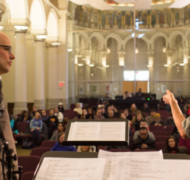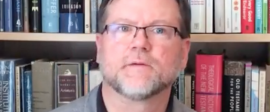Week 9: Alive in an Age of Redemption
Small Group Study / Produced by partner of TOW
Week 9 discusses the work of redemption. Senior Pastor Steve Watson uses Boaz’s actions in the book of Ruth to discuss how each individual worker can act as a “redeemer” for those around him or her.
Alive in an Age of Redemption (Audio)
Back to Table of Contents Back to Table of ContentsThis is the ninth sermon in the series: “Inspired: The Whole of Life with God in the Picture.” It was delivered by Steve Watson, Senior Pastor, at Reservoir Church Cambridge Massachusetts on November 8, 2015. This content is part of the Ruth and Parables curriculum, an 11-week integrated sermon and small group series on faith and work.

Ruth and Parables: Small Group Leaders Guide Week 9
Back to Table of Contents Back to Table of ContentsThis content is part of the Ruth and Parables curriculum, an 11-week integrated sermon and small group series on faith and work.
Topic 1 – Broken
Read Ruth 4:1-6
Ruth could be what today might be called “damaged goods.” She is a refugee. She is poor. She was previously married, which means that any man who re-marries her will be obligated to raise children to “carry on her husband’s name and keep the land in the family.” In other words, she carries baggage—legal, social, and maybe psychological—that her new husband will have to live with. Why bother? Perhaps she feels she is “too lost to bother finding,” as Steve put it in his sermon.
This week’s questions focus on the experience of feeling like Ruth—being lost or broken or in need of redemption. Perhaps this will be an opportunity to begin a movement toward freedom, joy, or love, whether in big ways or small. On the other hand, this might not match how you feel about yourself at the moment. Or you might not want to go to those places in your life right now. If that’s the case, you’re welcome to sort of sit out this week, stay on the sideline, or participate as much or as little as you like. You and your group have the responsibility to make sure that no one feels pushed to talk about anything they don’t really want to.
Question set 1
Note: Some groups or individuals may prefer to use these questions for individual contemplation rather than group discussion.;
- Steve said that when he was a teenager dealing with dating he found himself “pushing boundaries in an obnoxious way, yet at the same time afraid and ashamed” This seems like a good operational definition of being lost or broken. Is there an area of your live or work where you notice—or others point out to you--something similar about the way you act?
- Can you trace the source or cause of being broken or lost in this way?
- Can you speak the truth about your broken or lost spaces to yourself? Is there anyone else you have talked with? Is that something you’d like to be able to do?
Topic 2 – Redeemable
Read Luke 15:1-10
Question set 2
- “Maybe we are living in an age of redemption,” Steve suggested. Spectacle Island, the city of Pittsburgh. Maybe redeemed things are even better than the original sometimes. Do you agree? Do you see evidence of this as you go about your life and work?
- For something to be redeemable, there must have been something of value there originally. As Steve put it, “There is no penny not worth shining up?” What would you say is the value in you that might be obscured by the broken or lost bits? Or to put it another way, what got lost or broken in you or your life and work? Is it still there somewhere?
- “God is OCD (obsessive-compulsive disorder) in the habit of finding lost things,” according to Steve’s sermon. Do you believe Jesus’ statement “There is more joy in heaven over one lost sinner who repents and returns to God than over ninety-nine who are righteous and haven’t strayed away!” Really? God prefers redemption over perfection? Does God’s love for broken people and obsession for finding lost things explain anything about what’s going on in your life?
Topic 3 – Strong at the broken places
“The world breaks every one and afterward many are strong at the broken places.”
― Ernest Hemingway, A Farewell to Arms (p.226, Scribner Classics edition)
Steve said that his process of redemption from a broken beginning in the area of sexuality has taken a long time, decades in fact. The process is slow. But it seems the capacity his healing has given him for healthy emotional intimacy has been a big asset to others.
Question set 3
- From Steve’s sermon: “Jesus looks at the people that others think are beyond repair, and he says , ’Those are the people I’m looking for’” If this is true, what does it say about you? Is it possible that Jesus is not only tolerating people like you, but specifically looking for you? What about all the ways that you’re in good shape, the things about you that were never broken?
- Is there a strong place being formed in you from what has been broken? How do you know? How could you make use of it, and for whom? Do you need to revise your view of yourself? Is it time to make a change in the way you go about things in life or work?
- What time, space and resources is it worth giving to the redemption effort you are making? How specific can you be about the time, space and resources it makes sense to invest this week?










